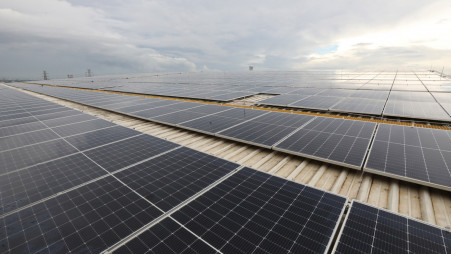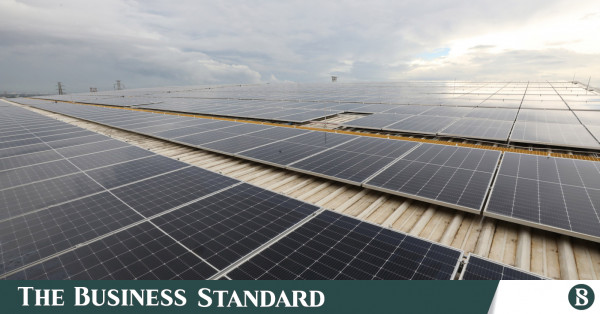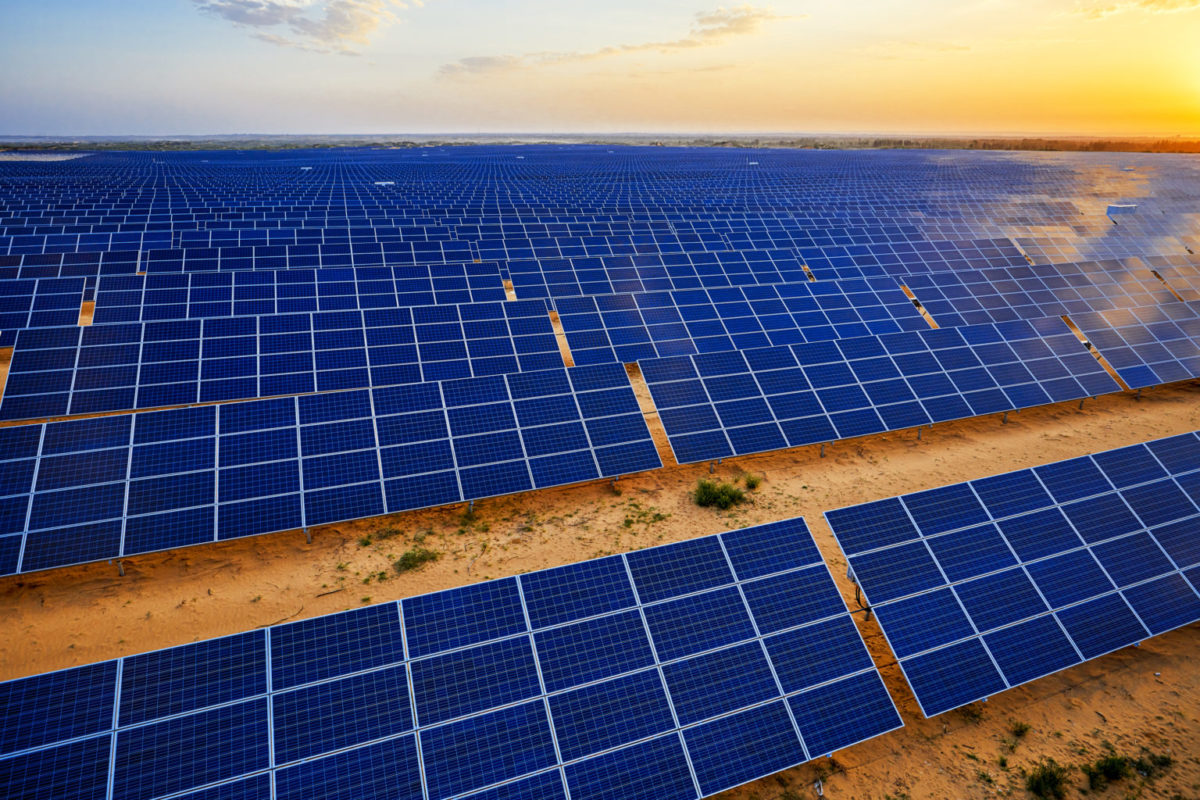Black_cats
ELITE MEMBER

- Joined
- Dec 31, 2010
- Messages
- 10,031
- Reaction score
- -5
Chinese consortium gets nod to set up 100MW solar plant at Gouripur
08 November, 2023, 10:35 pm
Last modified: 08 November, 2023, 10:40 pm

The Cabinet Committee on Public Procurement on Wednesday approved the tariff proposal for the setting up of the power plant. File photo: TBS
The government has approved the setting up of another 100MW solar power plant in the private sector on a "no electricity, no payment" basis.
A Chinese consortium of Cassiopea Fashion Limited, Xizi Clean Energy Equipment Manufacturing Company, and Cassiopea Apparels Limited will set up the power plant at Gouripur in Mymensingh on a "Build, Own and Operate" basis.
The Cabinet Committee on Public Procurement on Wednesday approved the tariff proposal for the setting up of the power plant, said Additional Secretary to the Cabinet Division Syed Mahbub Khan after the meeting, presided over by Finance Minister AHM Mustafa Kamal.
As per the approved tariff, the government will purchase power from the solar plant for the next 20 years at a rate of $0.10/kWh, which is Tk11.05 per kWh at the current exchange rate. In line with the current exchange rate, the total expenditure of the government on purchasing power from the solar plant will be Tk3,580.80 crore over two decades.
It will take 24 months to build the plant, an official of the Power Division told The Business Standard.
However, the government will consider the dollar-taka exchange rate of Sonali Bank on the first day of a month after the billing month in paying the electricity bill. In other words, if the taka depreciates, the price of electricity will also increase.
The government has been attaching importance to the development and expansion of renewable energy to ensure universal electricity service and energy security. Hence, it is encouraging private sector participation in power generation through using solar energy, the largest source of renewable energy.
An official told TBS that the sponsor company will manage the entire project cost, including the necessary land resources, transmission lines for power transmission and construction of substations.
The sponsor company had offered the Power Division a power purchase agreement with the government for a period of 25 years. It had proposed a tariff of $0.14/kWh, which is Tk15.47 per kWh at the current exchange rate.
According to the brief sent by the Power Division to the Cabinet Committee on Public Procurement, a 132KV common switchyard is to be constructed at the proposed solar power plant for power evacuation and from there a 9.5km 132KV double circuit transmission for bay extension at the under-construction Shambhuganj grid substation end. The sponsor company will construct the line and provide the required land.
The Cabinet Committee on Public Procurement approved the tariffs for three solar-based power plants from April to August. Among them, the tariff of 44MW power plant at Trishal of Mymensingh and 400MW power plant at Rampal were fixed at $0.10/kWh and the tariff of 50MW power plant at Dimla of Nilphamari was fixed at $0.0998/kWh.
Power Division officials said there is another proposal to build a 100MW solar-based power plant at Trishal, which will be implemented by a consortium consisting of Total Fren SA Ltd gchQ Anand Energy pte ltd. The cost of construction of Common Switchyard, purchase of required land at Shambhuganj grid substation end and cost of construction of transmission line will be borne by both sponsoring companies proportionately.
Besides, the cabinet committee approved the extension of the term and tariff of Ashuganj 55MW gas-based rental power plant. The government's 2nd phase (5 years) contract with sponsor company Precision Energy Limited expired in April and the company proposed extending the term. The committee approved the renewal of the contract for five years at Tk6.256 per kWh on a "no electricity, no payment" basis. The sponsor company will receive Tk1205 crore as tariff during this extended period.
Meanwhile, the cabinet committee also approved a proposal to import 33.60 lakh MMBTU of LNG from the spot market. Total Energies Gas & Power Limited will provide the LNG at around Tk713 crore at $16.34 per MMBTU.

 www.tbsnews.net
www.tbsnews.net
ENERGY
Abul Kashem08 November, 2023, 10:35 pm
Last modified: 08 November, 2023, 10:40 pm
The government will purchase power from the solar plant for the next 20 years at a rate of $0.10/kWh
The Cabinet Committee on Public Procurement on Wednesday approved the tariff proposal for the setting up of the power plant. File photo: TBS
The Cabinet Committee on Public Procurement on Wednesday approved the tariff proposal for the setting up of the power plant. File photo: TBS
The government has approved the setting up of another 100MW solar power plant in the private sector on a "no electricity, no payment" basis.
A Chinese consortium of Cassiopea Fashion Limited, Xizi Clean Energy Equipment Manufacturing Company, and Cassiopea Apparels Limited will set up the power plant at Gouripur in Mymensingh on a "Build, Own and Operate" basis.
The Cabinet Committee on Public Procurement on Wednesday approved the tariff proposal for the setting up of the power plant, said Additional Secretary to the Cabinet Division Syed Mahbub Khan after the meeting, presided over by Finance Minister AHM Mustafa Kamal.
As per the approved tariff, the government will purchase power from the solar plant for the next 20 years at a rate of $0.10/kWh, which is Tk11.05 per kWh at the current exchange rate. In line with the current exchange rate, the total expenditure of the government on purchasing power from the solar plant will be Tk3,580.80 crore over two decades.
It will take 24 months to build the plant, an official of the Power Division told The Business Standard.
However, the government will consider the dollar-taka exchange rate of Sonali Bank on the first day of a month after the billing month in paying the electricity bill. In other words, if the taka depreciates, the price of electricity will also increase.
The government has been attaching importance to the development and expansion of renewable energy to ensure universal electricity service and energy security. Hence, it is encouraging private sector participation in power generation through using solar energy, the largest source of renewable energy.
An official told TBS that the sponsor company will manage the entire project cost, including the necessary land resources, transmission lines for power transmission and construction of substations.
The sponsor company had offered the Power Division a power purchase agreement with the government for a period of 25 years. It had proposed a tariff of $0.14/kWh, which is Tk15.47 per kWh at the current exchange rate.
According to the brief sent by the Power Division to the Cabinet Committee on Public Procurement, a 132KV common switchyard is to be constructed at the proposed solar power plant for power evacuation and from there a 9.5km 132KV double circuit transmission for bay extension at the under-construction Shambhuganj grid substation end. The sponsor company will construct the line and provide the required land.
The Cabinet Committee on Public Procurement approved the tariffs for three solar-based power plants from April to August. Among them, the tariff of 44MW power plant at Trishal of Mymensingh and 400MW power plant at Rampal were fixed at $0.10/kWh and the tariff of 50MW power plant at Dimla of Nilphamari was fixed at $0.0998/kWh.
Power Division officials said there is another proposal to build a 100MW solar-based power plant at Trishal, which will be implemented by a consortium consisting of Total Fren SA Ltd gchQ Anand Energy pte ltd. The cost of construction of Common Switchyard, purchase of required land at Shambhuganj grid substation end and cost of construction of transmission line will be borne by both sponsoring companies proportionately.
Besides, the cabinet committee approved the extension of the term and tariff of Ashuganj 55MW gas-based rental power plant. The government's 2nd phase (5 years) contract with sponsor company Precision Energy Limited expired in April and the company proposed extending the term. The committee approved the renewal of the contract for five years at Tk6.256 per kWh on a "no electricity, no payment" basis. The sponsor company will receive Tk1205 crore as tariff during this extended period.
Meanwhile, the cabinet committee also approved a proposal to import 33.60 lakh MMBTU of LNG from the spot market. Total Energies Gas & Power Limited will provide the LNG at around Tk713 crore at $16.34 per MMBTU.

Chinese consortium gets nod to set up 100MW solar plant at Gouripur
The government will purchase power from the solar plant for the next 20 years at a rate of $0.10/kWh








